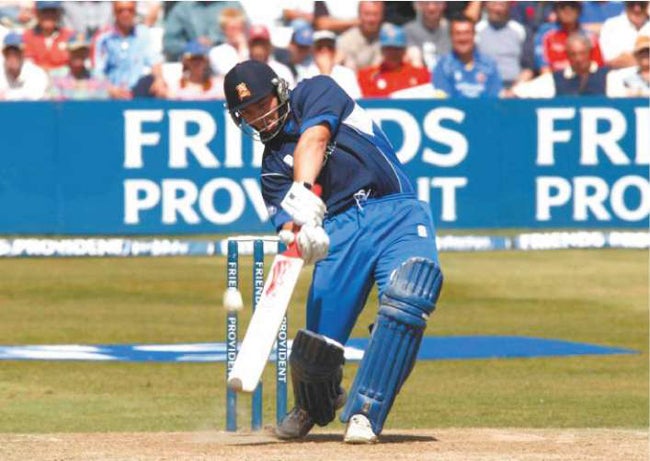Essex 285-8 Yorkshire 198: Master blaster Napier keeps Gough's menat a distance

Essex County Council really ought to erect a street sign outside the county ground in Chelmsford saying "Beware Graham Napier". This stocky, blonde local lad hit 152 not out 12 days ago. That was the highest-ever score in a Twenty20 game in England. He came in yesterday in the 40th over of the Friends Provident Trophy semi-final when Essex's batting had stumbled suddenly to 182 for 4. When he was out in the 50th over the 28-year-old Napier had transformed Essex's fortunes, scoring 61 off 34 balls – his 50 came off 27 balls – with six sixes and two fours. It proved more than enough to secure Essex a Lord's final against Kent on 16 August.
There is nothing subtle about Napier's batting style. He puts his front foot down the wicket and with a full swing from powerful shoulders he clouts the ball, mostly to long on, a little fine of cow corner. Two of the sixes cleared the external fence as well as the boundary. Someone must have tipped off the umpire Peter Hartley because he had replacements balls in his pocket, and Napier's progress was uninterrupted.
When he was out Essex had vanquished doubt, and the crowd was en fete. They might be in the Second Division of the Championship but if status in county cricket was defined by performances in the one-day game Essex would sit snugly in the top drawer. At Chelmsford, the Friends Provident Trophy and the Twenty20 Cup – they play a quarter-final tomorrow – are sell-out events, though there were only 5,200 seats to fill yesterday, and that included a meadow-like enclosure in front of the pavilion packed with kids contentedly sitting on the grass in the warm sunshine.
And as the sun went down, so did Yorkshire. Having established a strong position at 25 overs, they went to pieces between the 36th and 38th overs, losing four wickets for three runs, three of them to a South African-born Dutchman called Ryan ten Doeschate, who caught the fourth after a singular piece of juggling in the covers when he held the ball at the third, agonising attempt.
Among the four to fall were Anthony McGrath and Jacques Rudolph, two players who were capable of making the game a close one, but their going opened the door to Yorkshire's tail.
Having won the toss, Essex batted first. Alastair Cook and Jason Gallian were untroubled by Matthew Hoggard, bowling with the aid of a strong breeze, and Tim Bresnan. Cook was dismissive of Hoggard, who was replaced after only three overs by the substantial figure of Darren Gough. He managed to pacify both batsmen, who replied by taking risky runs until Gallian was run out for 28 having been undone by a direct hit by Bresnan at mid-off.
Bresnan was to do the same to Cook taking a second run to third man. By then Cook had scored a steady 95 (127 balls, 10 fours) and Essex seemed comfortably placed at 180 for 3. When Ravi Bopara was out two runs later edging a catch to the keeper the balance of power was transformed. Napier and Jamie Foster were put in charge of a salvage operation, and it was floundering. Five wickets were down for 216 in the 44th over. Yorkshire were the cocky ones.
But not for long. Bold Napier was thoroughly warmed up, and he was particularly hard on poor Hoggard. Grant Flower entered into the spirit of things, scoring 21 from 15 balls and adding 54 with Napier and making sure that Essex would have a competitive score. They finished on 285 for 8, 63 of them off the last five overs.
Yorkshire were not intimidated, at first. After all, they had won the last 50-over trophy match between the two teams when each scored 283 on this ground, but Yorkshire had lost fewer wickets. And for 35 overs, they seemed to be making a game of it, reaching 150 more quickly than Essex had. That was when the rot set in with remarkable speed.
Ten Doeschate was having a purple period that echoed Napier's. His three wickets cost 30, plus his catch, and he could rightly claim to be the architect of Yorkshire's collapse. They lost nine wickets for 58 runs, the last to fall being Gough.
In his last season as Yorkshire's captain, Gough had hoped to celebrate with a Trophy final at Lord's. He will have to watch on television instead.
Subscribe to Independent Premium to bookmark this article
Want to bookmark your favourite articles and stories to read or reference later? Start your Independent Premium subscription today.

Join our commenting forum
Join thought-provoking conversations, follow other Independent readers and see their replies